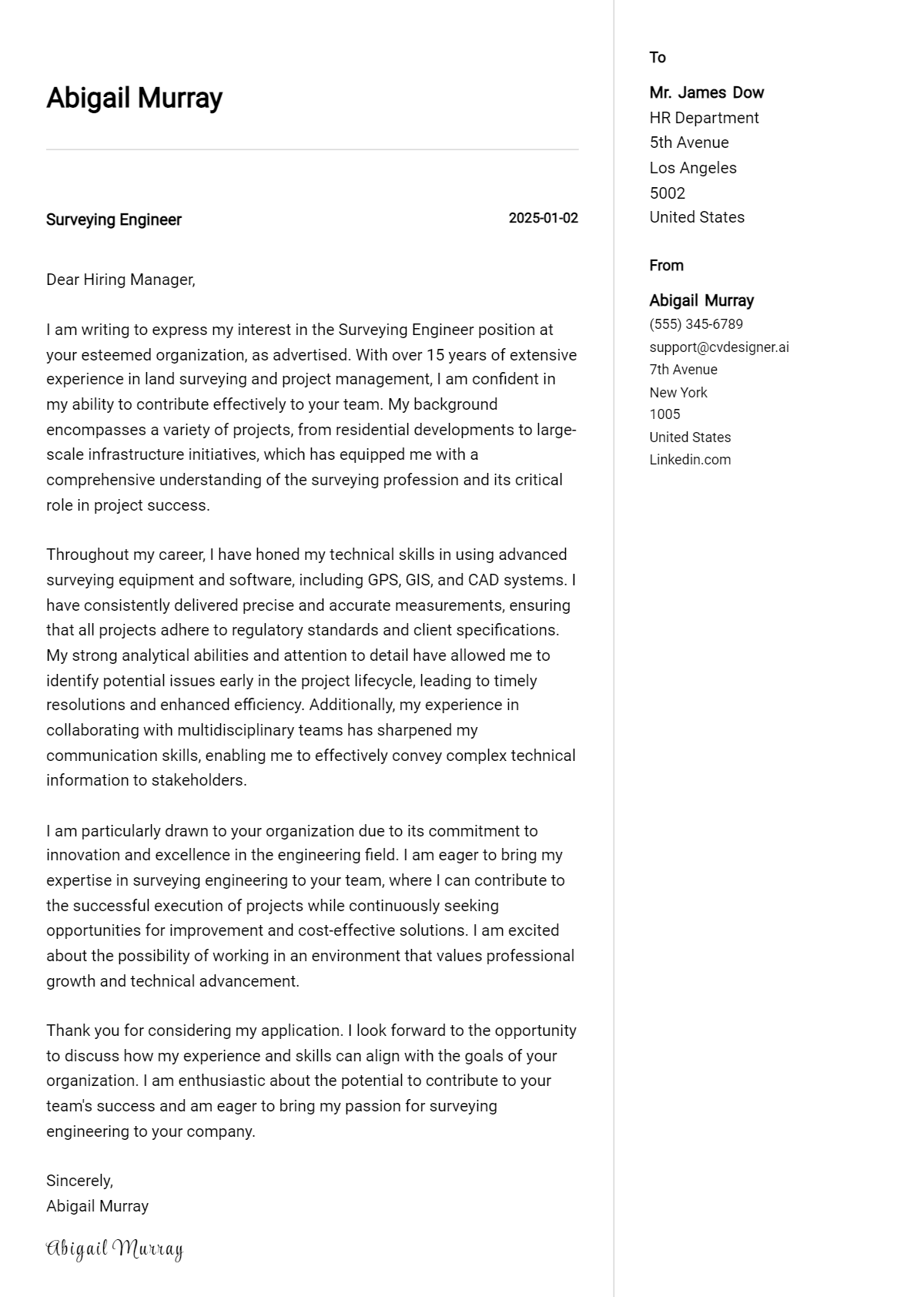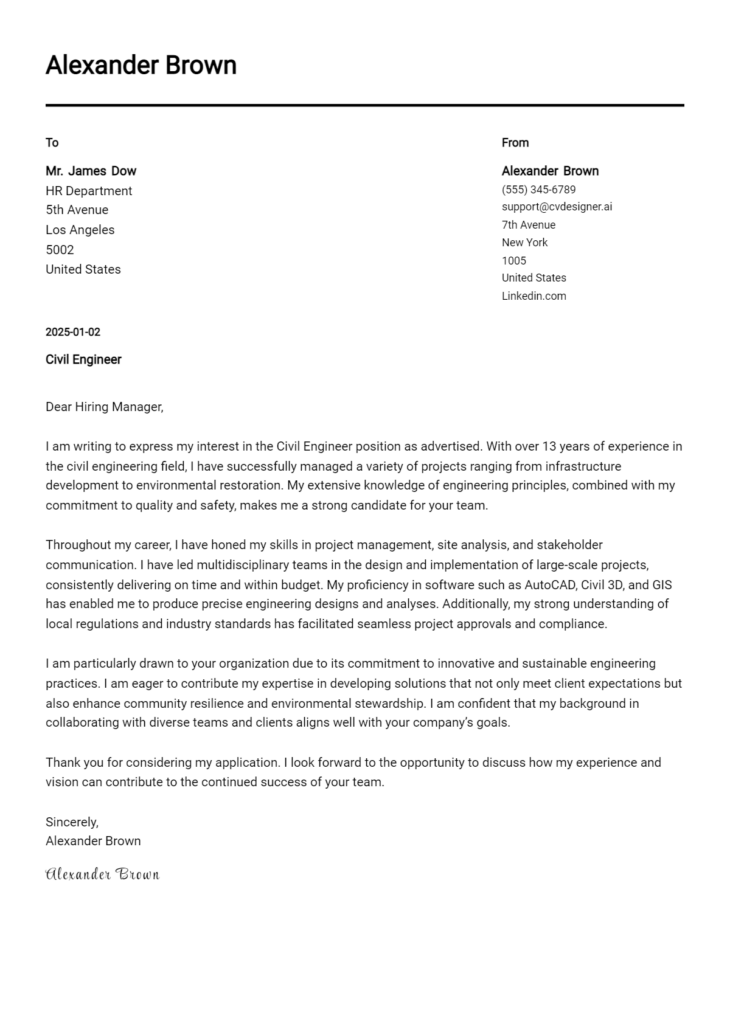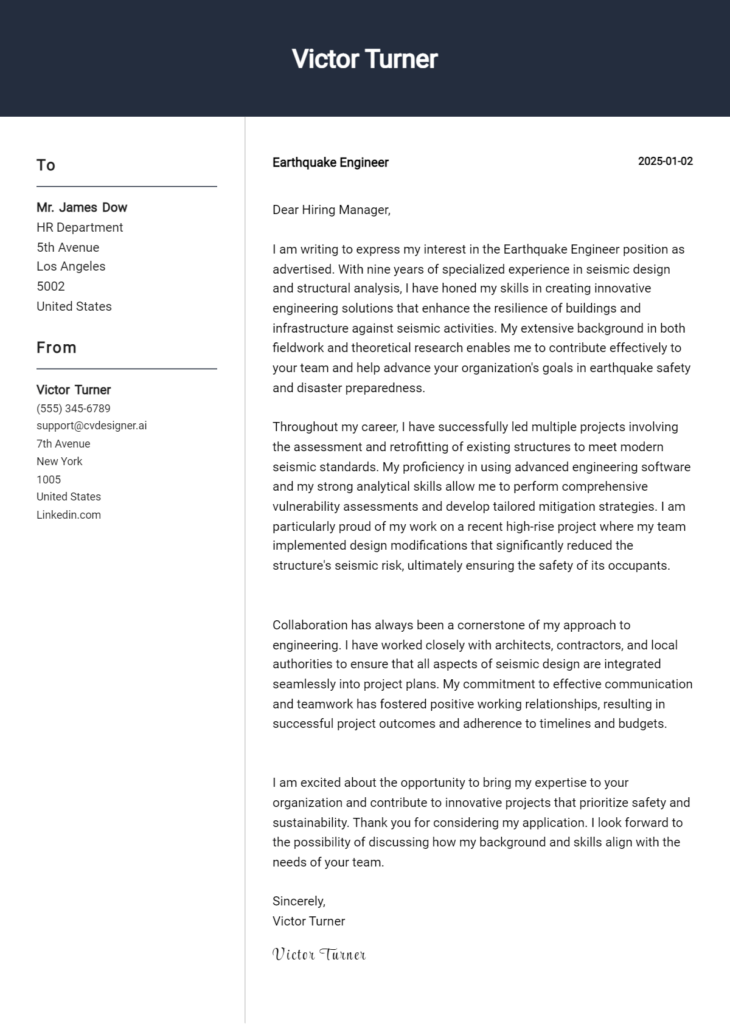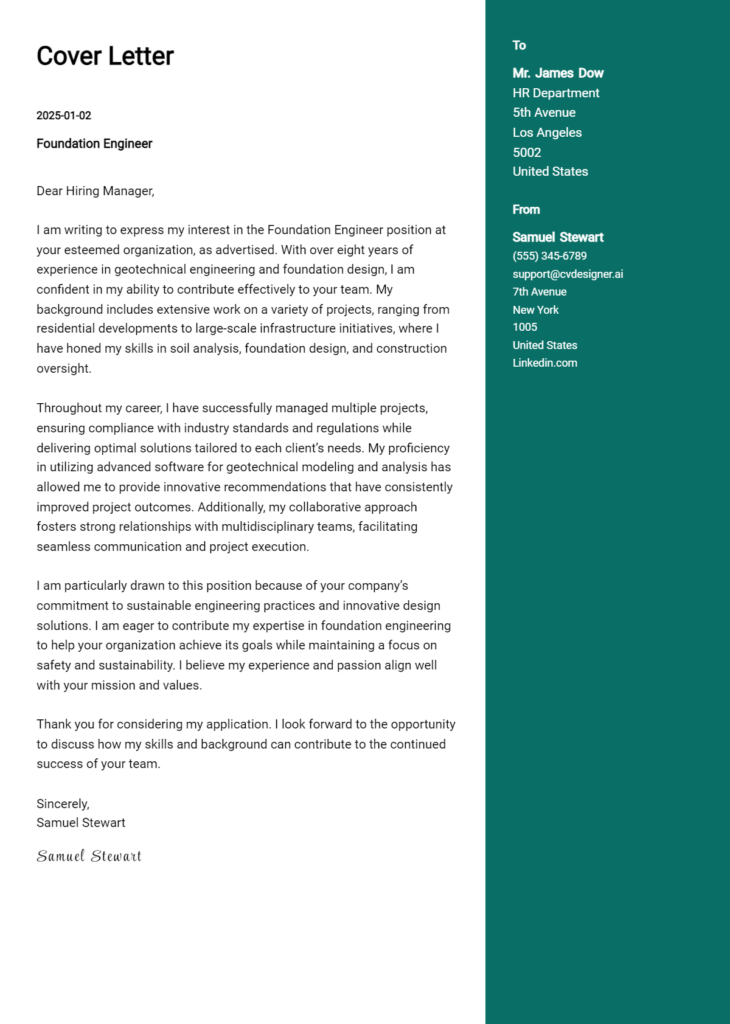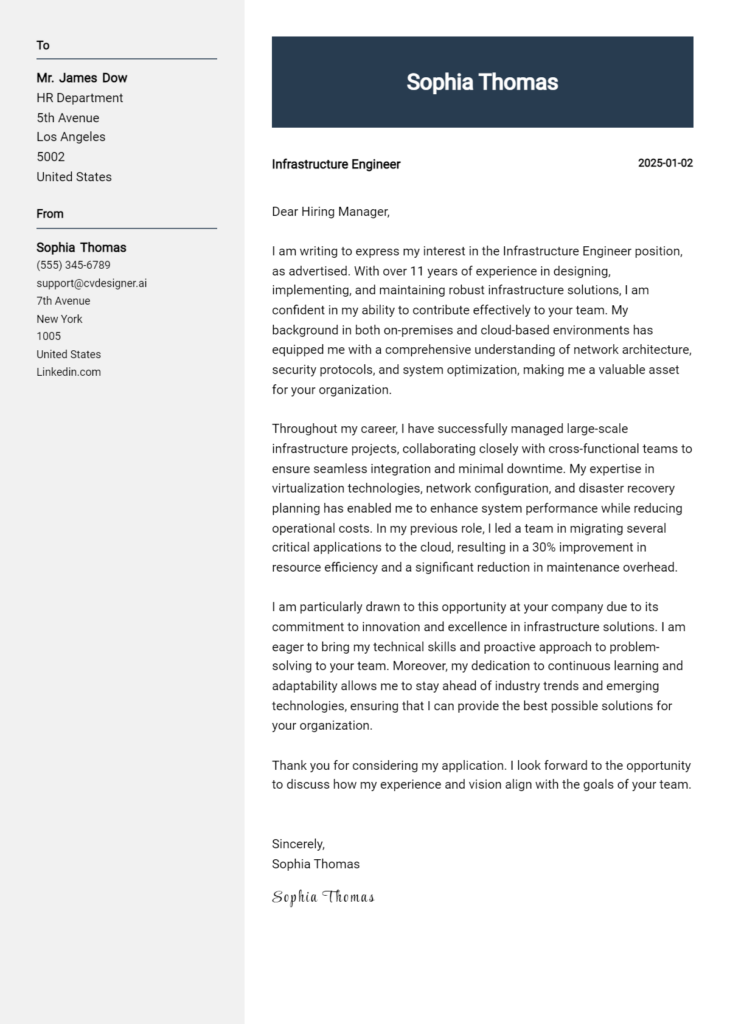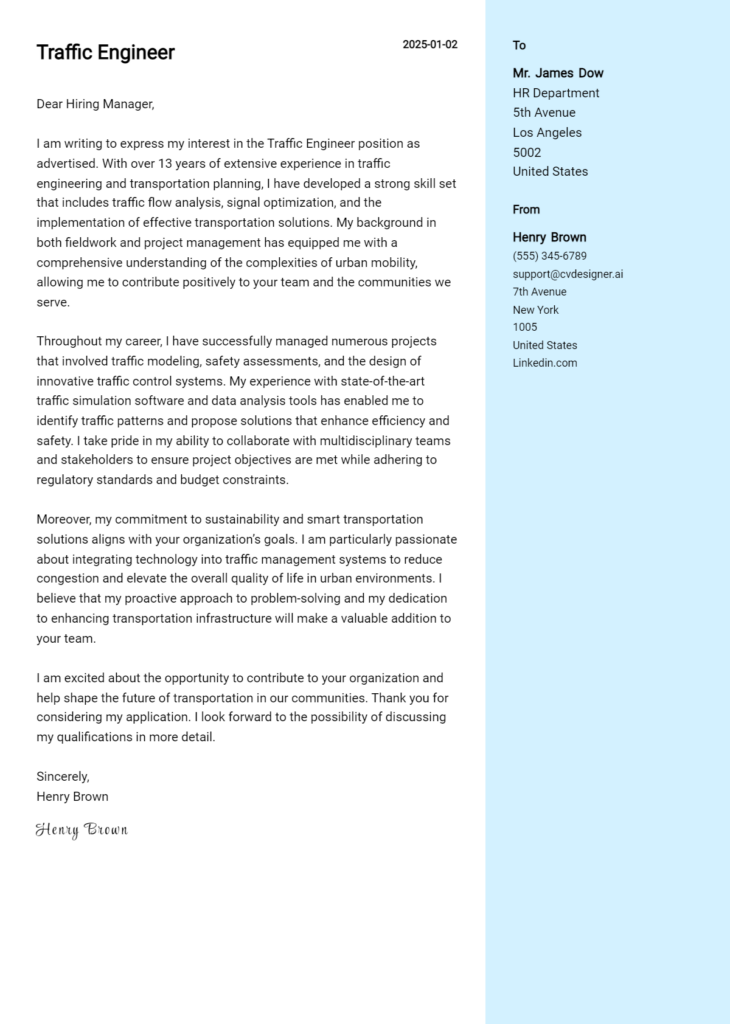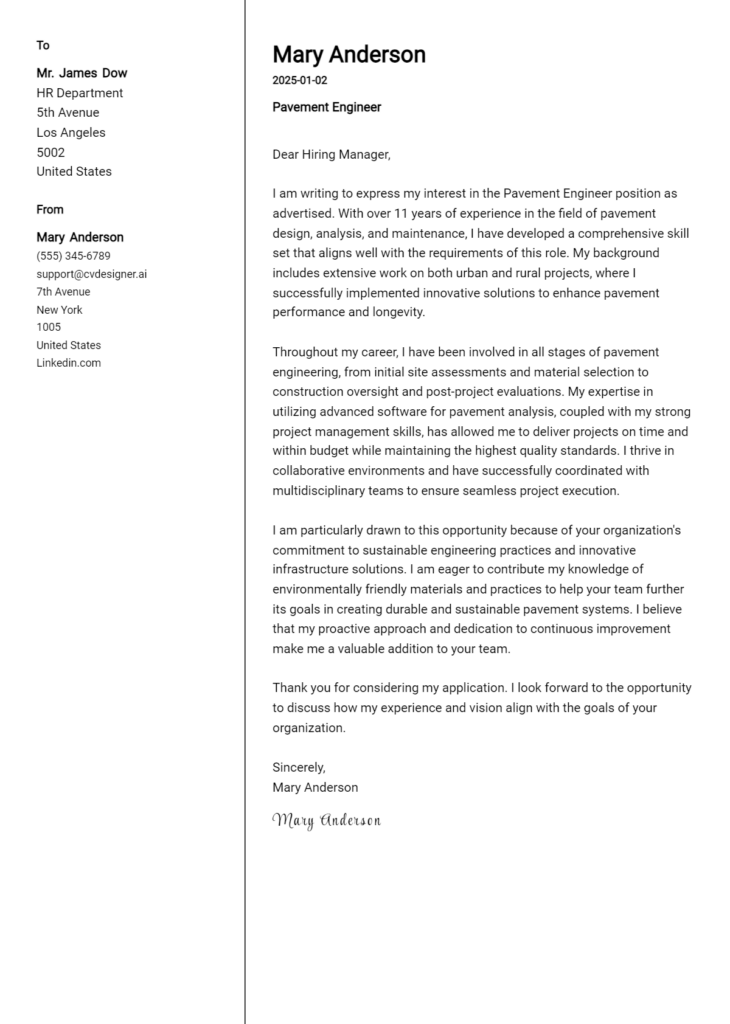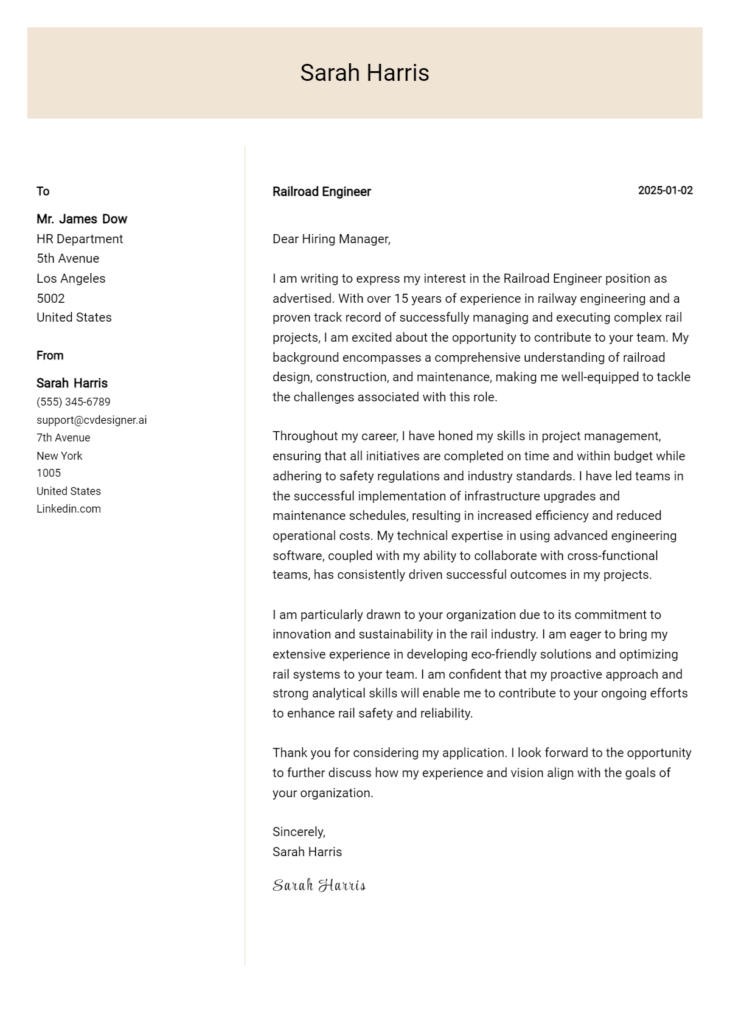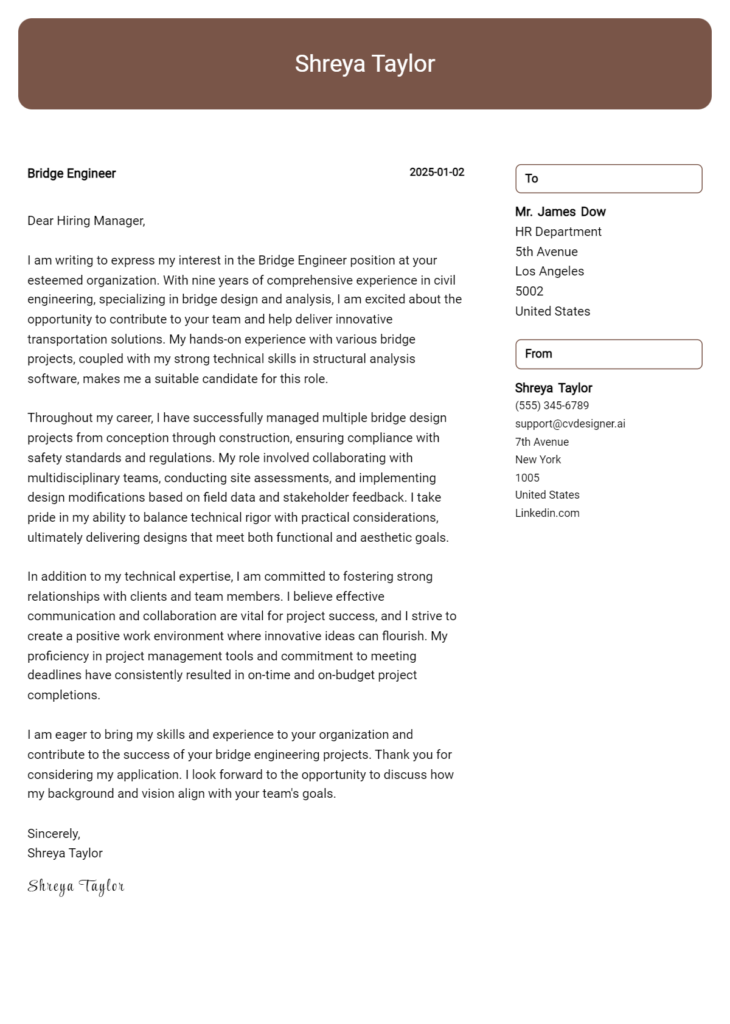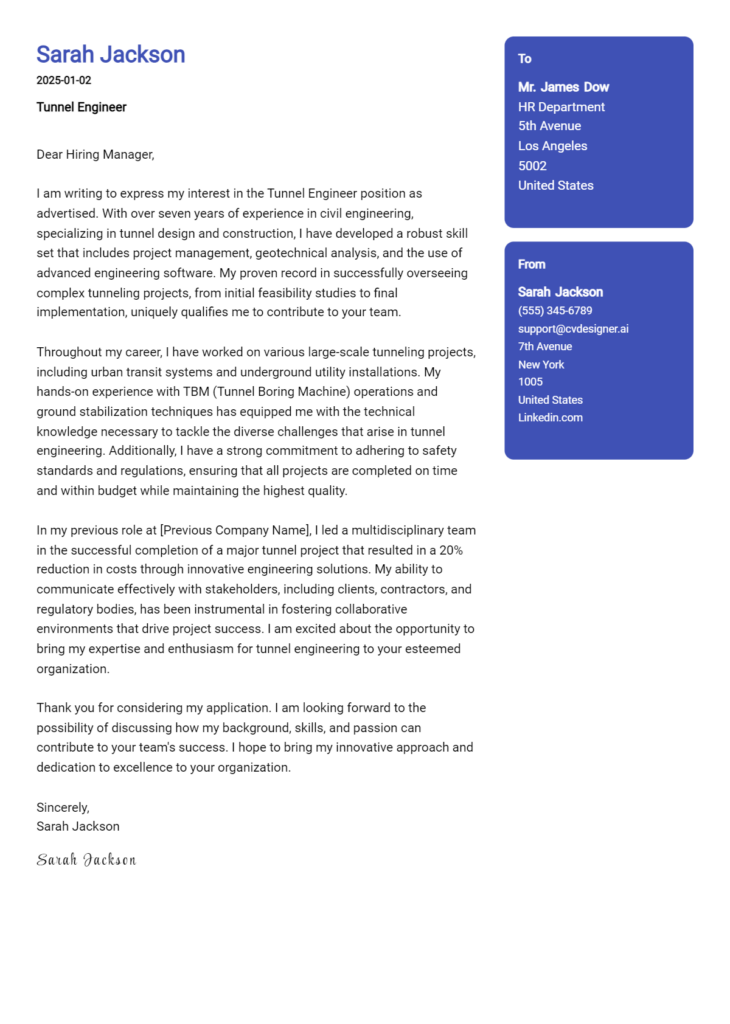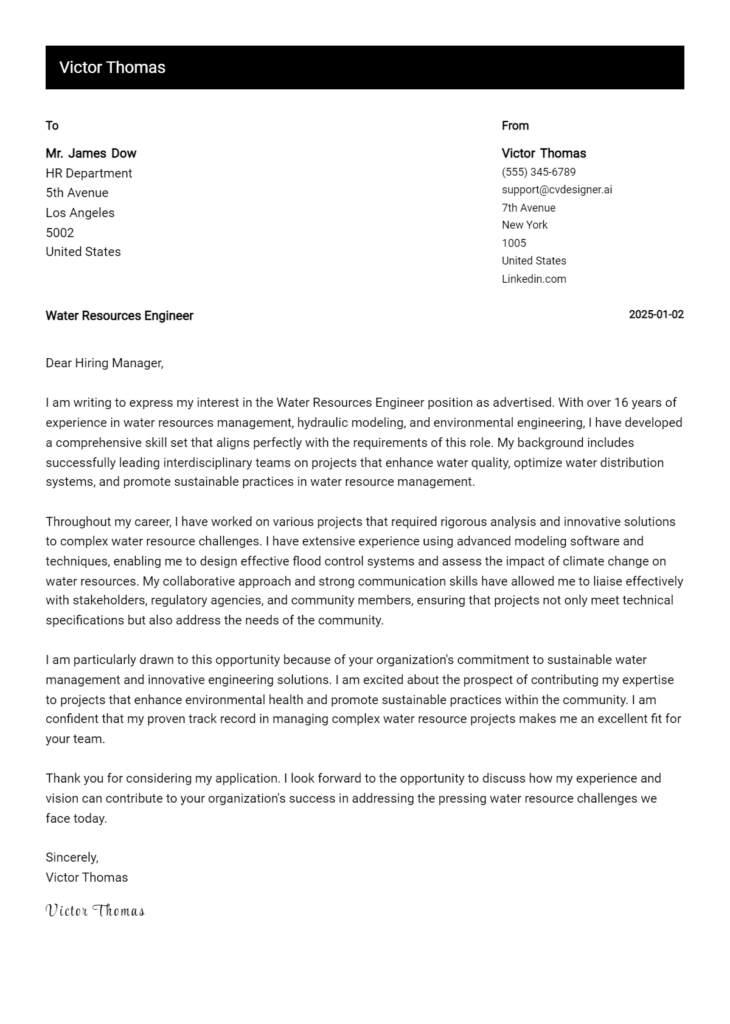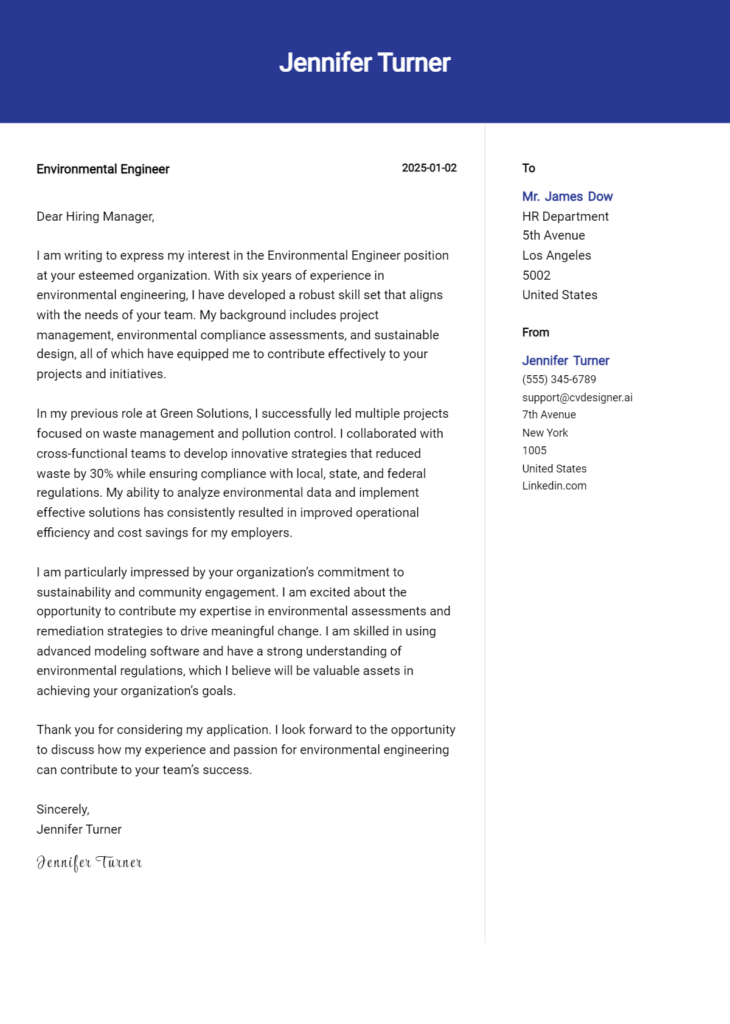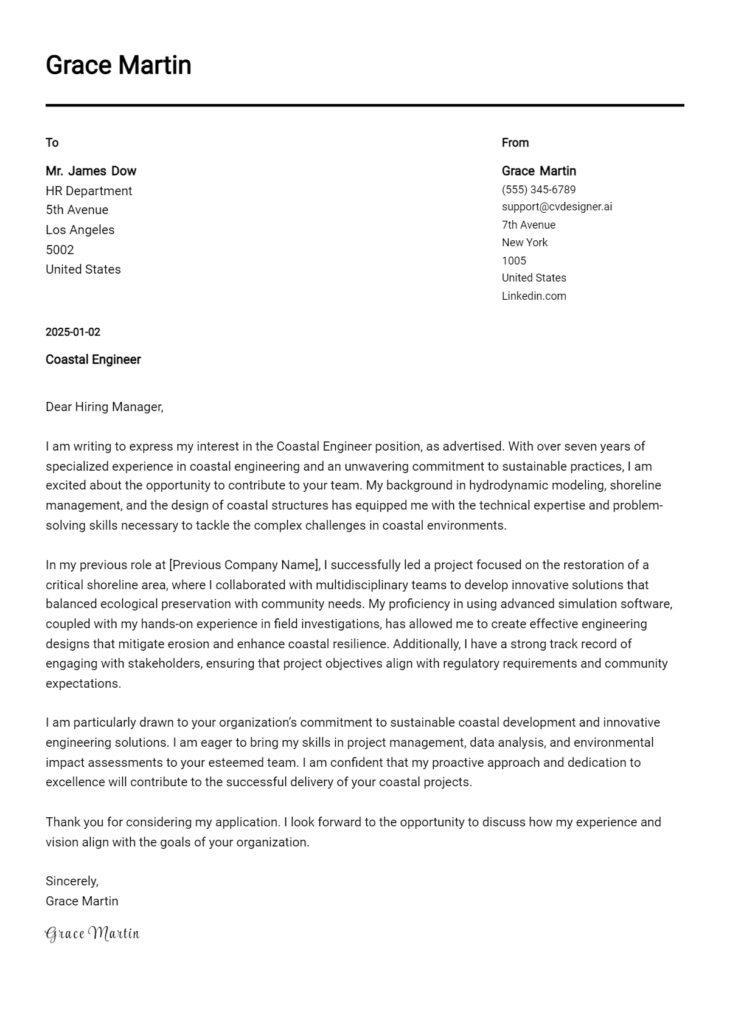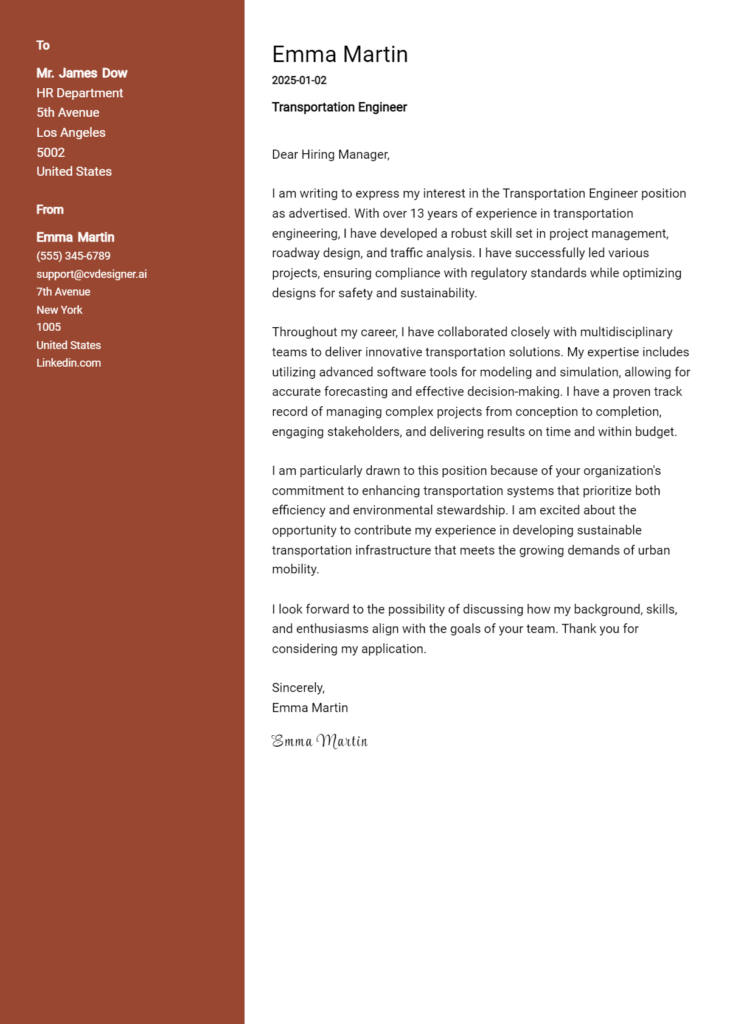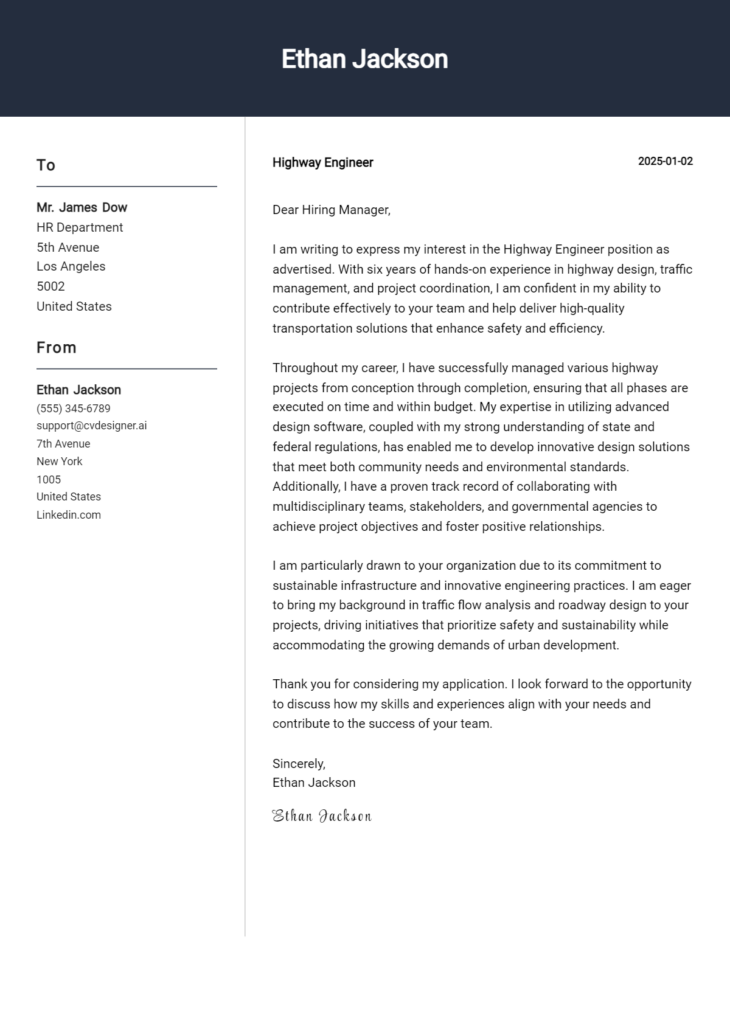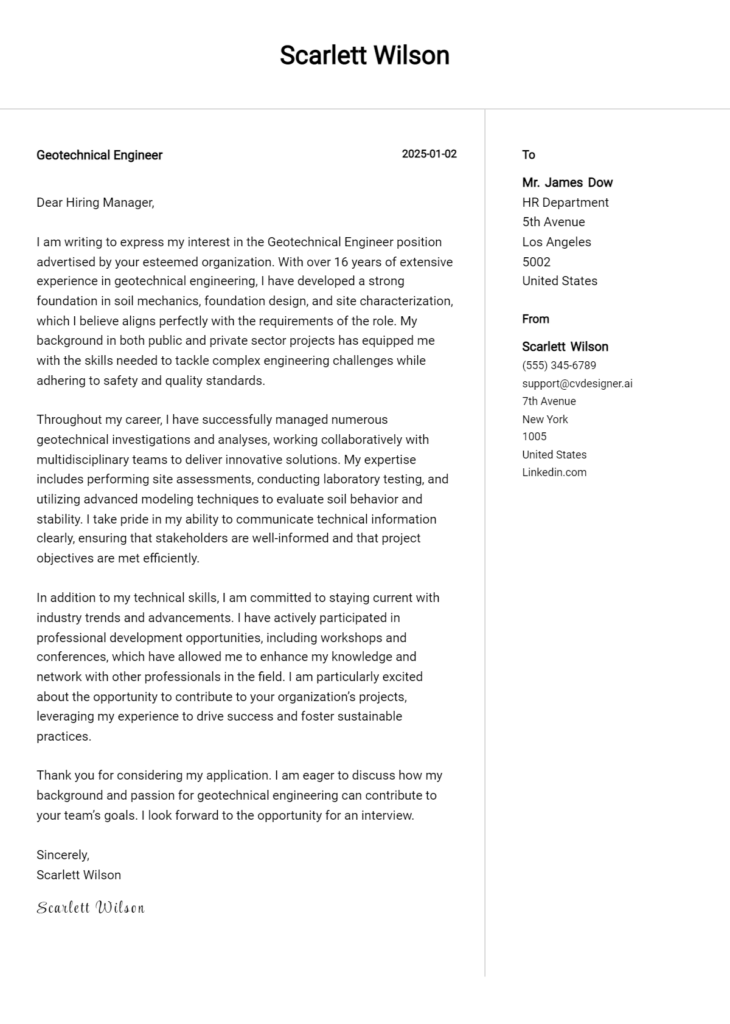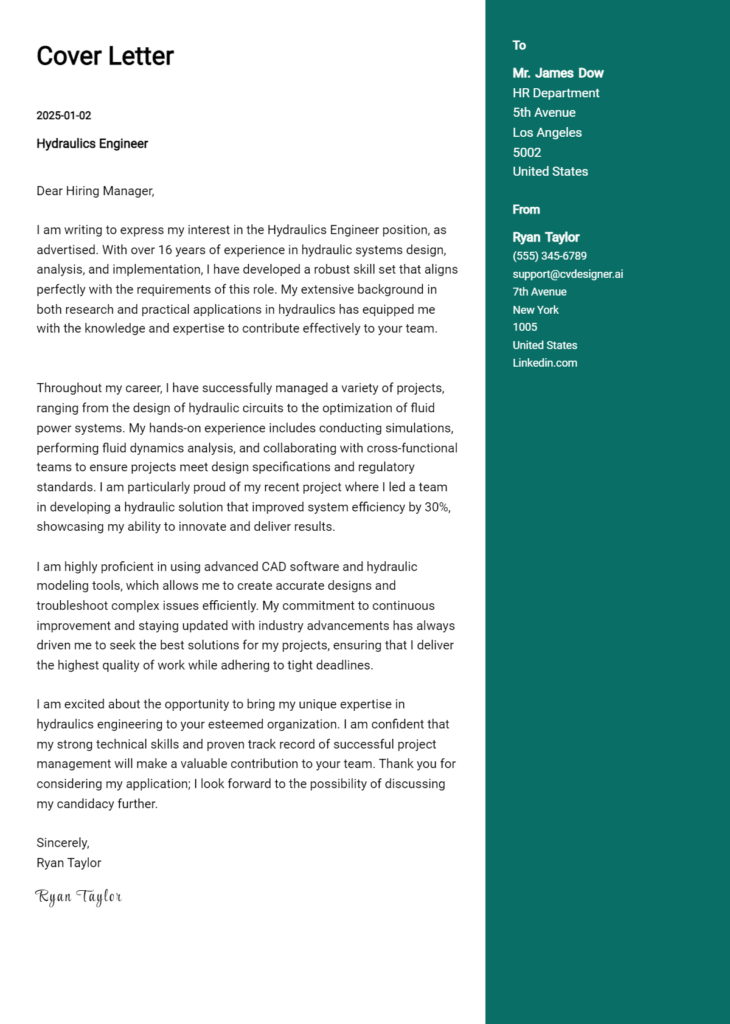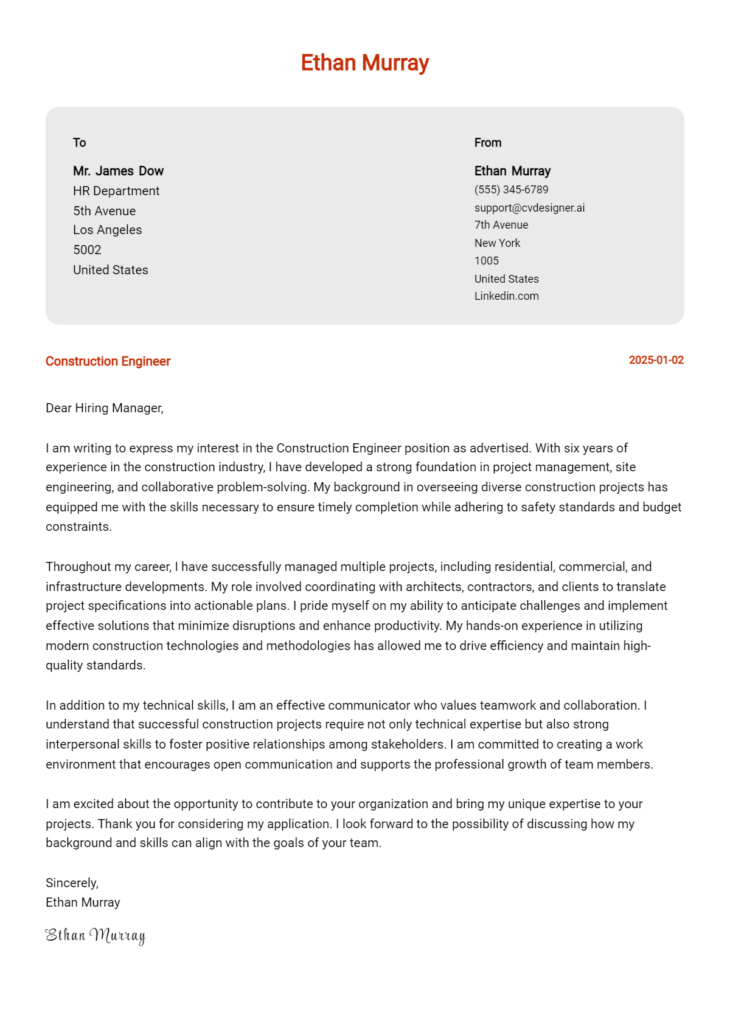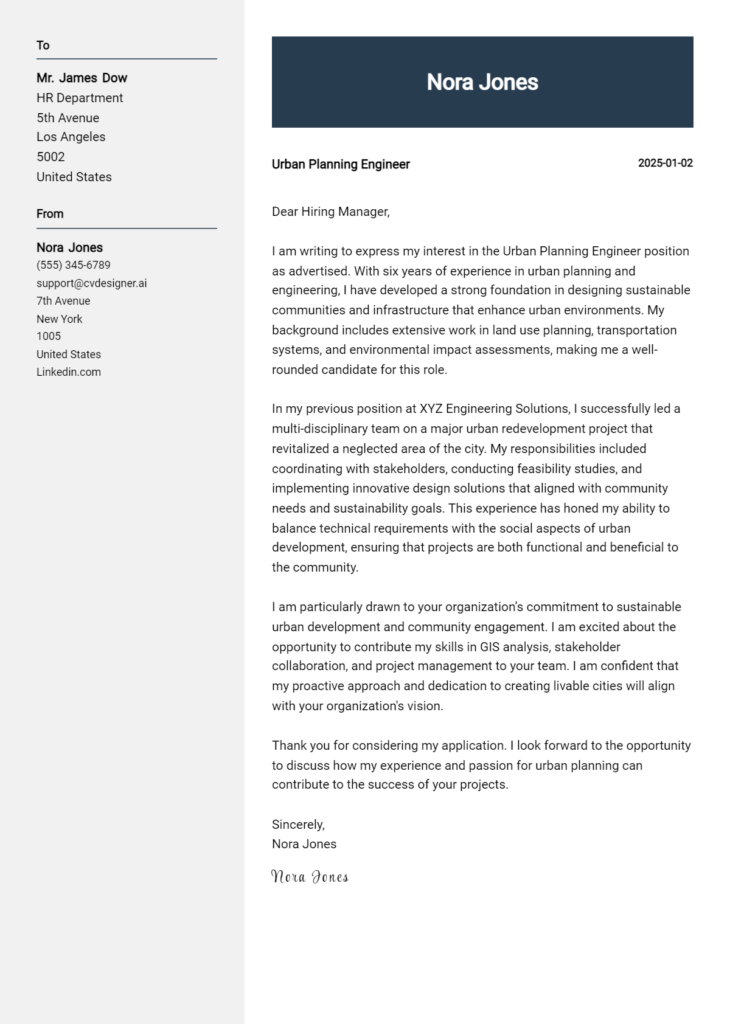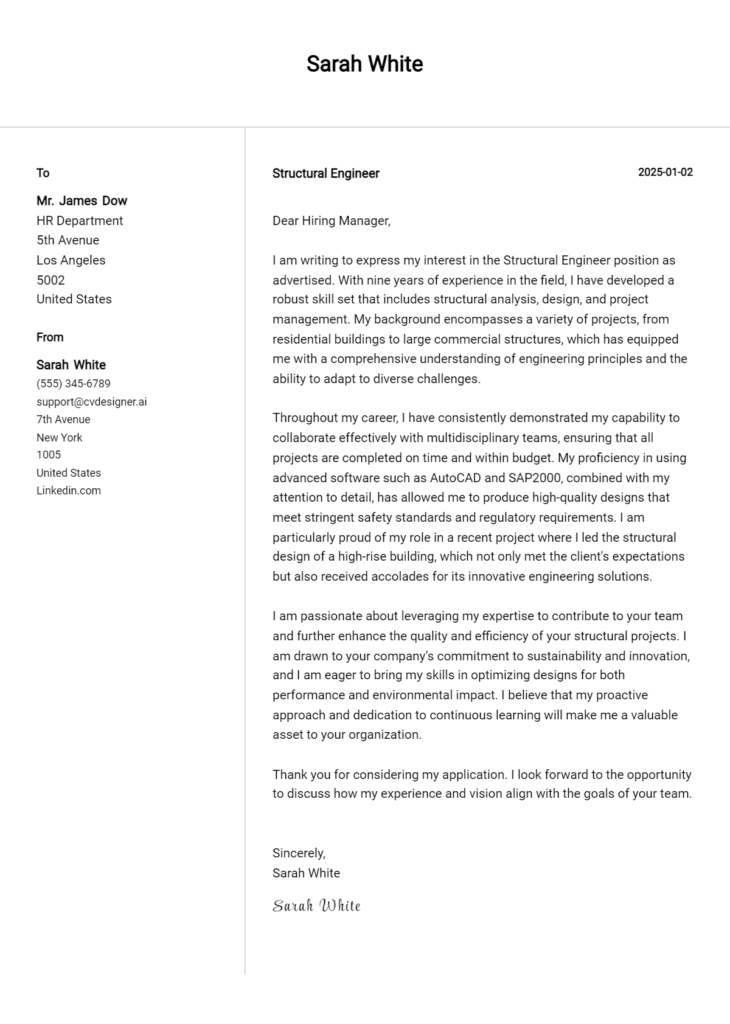Surveying Engineer Cover Letter Examples
Explore additional Surveying Engineer cover letter samples and guides and see what works for your level of experience or role.
How to Format a Surveying Engineer Cover Letter?
Crafting a compelling cover letter is vital for Surveying Engineers, as it not only showcases your technical expertise but also reflects your organizational skills and attention to detail. The format of your cover letter serves as a first impression, allowing you to demonstrate your ability to communicate effectively and professionally—qualities that are essential in the surveying field.
In this guide, we'll outline how to structure your cover letter, providing insights and examples specific to the surveying profession to help you create a persuasive document.
We'll focus on the essential components of a professional cover letter, including:
- Cover Letter Header
- Cover Letter Greeting
- Cover Letter Introduction
- Cover Letter Body
- Cover Letter Closing
Each section is crucial for presenting your qualifications and professionalism. Let’s break down each part and explain how to make your surveying engineer cover letter stand out.
Importance of the Cover Letter Header for a Surveying Engineer
The cover letter header is a critical component of any professional correspondence, especially for a Surveying Engineer. It sets the tone for the communication and provides essential information that establishes your identity and intentions. A well-structured header includes your contact information, the date, and the recipient's details, ensuring clarity and professionalism. This clear presentation not only reflects your attention to detail—an essential trait for a Surveying Engineer—but also facilitates easy communication.
Here are examples of a strong and a weak cover letter header:
Strong Example
John Doe 123 Engineering Lane Cityville, ST 12345 john.doe@email.com (123) 456-7890 October 1, 2023 Ms. Jane Smith Hiring Manager XYZ Surveying Solutions 456 Surveyor Rd Townsville, ST 67890
Weak Example
J. Doe 10/1/23 Jane XYZ Co.
In the strong example, the header is complete, well-organized, and professional, providing all necessary details. The weak example, however, lacks clarity and important information, making it difficult for the recipient to understand who the applicant is and how to contact them.
The Importance of a Strong Cover Letter Greeting for Surveying Engineers
A well-crafted cover letter greeting is crucial in establishing a positive first impression and setting the tone for the rest of your application. By addressing the hiring manager directly, you not only demonstrate professionalism but also show that you have taken the time to personalize your letter. This personal touch can distinguish you from other candidates who may opt for a more generic approach. To avoid common pitfalls, make sure to research the recipient's name if it is available; this small detail can significantly enhance the impact of your greeting.
When writing your greeting, steer clear of overly formal or vague phrases. Instead, aim for a warm yet professional tone that reflects both your personality and the industry standards.
Strong Greeting Example
Dear Mr. Smith,
Weak Greeting Example
To Whom It May Concern,
The Importance of a Compelling Cover Letter Introduction for a Surveying Engineer
Crafting a well-thought-out introduction for a cover letter is crucial for any job application, especially for a Surveying Engineer. This opening paragraph serves as the first impression, aiming to capture the hiring manager's attention and set the tone for the rest of the letter. It should express genuine interest in the role while briefly highlighting key skills or achievements that demonstrate the candidate's qualifications. An effective introduction can make a significant difference in standing out among other applicants.
Strong Example
Dear [Hiring Manager's Name], I am excited to apply for the Surveying Engineer position at [Company Name] as advertised on [Job Board/Company Website]. With over five years of experience in precision surveying and a proven track record of successfully managing large-scale projects, I am confident in my ability to contribute to your team. My expertise in utilizing advanced surveying technology and my commitment to delivering accurate and timely results align perfectly with the values of [Company Name].
Weak Example
To whom it may concern, I am writing to apply for the Surveying Engineer position. I have some experience in surveying and I think I would be a good fit for the job. I am looking for new opportunities and hope you will consider my application.
Purpose of the Cover Letter Body for a Surveying Engineer
The body of a cover letter for a Surveying Engineer serves as a critical opportunity for candidates to effectively communicate their relevant skills, experiences, and the unique value they can bring to a prospective employer. This section should not only highlight the candidate's technical expertise in surveying practices, software, and methodologies but also emphasize successful projects and accomplishments that demonstrate their capability to contribute positively to the company's goals. By detailing specific experiences, such as leading a high-precision survey for a major construction project or implementing innovative surveying technologies that improved efficiency, candidates can paint a vivid picture of their qualifications and fit for the role.
Strong Example
Dear Hiring Manager, I am writing to express my interest in the Surveying Engineer position at XYZ Company. In my previous role at ABC Engineering, I successfully led a team in conducting a comprehensive topographic survey for a $5 million commercial development project. By utilizing advanced GIS technology, we enhanced the accuracy of our data collection, resulting in a 20% reduction in project time and significant cost savings for our client. My experience with CAD software and my commitment to precision allows me to deliver high-quality results consistently. I am excited about the opportunity to bring my expertise to XYZ Company and contribute to your upcoming projects with the same dedication and innovation. Sincerely, John Doe
Weak Example
Dear Hiring Manager, I am interested in the Surveying Engineer position at your company. I have some experience in surveying and have worked on a few projects in the past. I think I would be a good fit for the job because I have some skills in using surveying equipment. I hope to learn more and contribute to your team. Best, John Doe
Importance of the Cover Letter Closing for a Surveying Engineer
The closing paragraph of a cover letter is crucial as it serves to summarize your qualifications, reiterate your enthusiasm for the position, and encourage the hiring manager to take the next steps, such as reviewing your resume or scheduling an interview. A strong closing can leave a positive impression and reinforce your suitability for the role, while a weak closing may diminish the overall impact of your application.
Strong Example
Thank you for considering my application for the Surveying Engineer position. With my extensive experience in land surveying, project management, and my commitment to accuracy and efficiency, I am excited about the opportunity to contribute to your team. I look forward to the possibility of discussing how my skills can align with your needs. I am eager to further explore this opportunity and hope to schedule an interview soon. Please find my resume attached for your review.
Weak Example
I think I would be a good fit for the Surveying Engineer job. I hope you look at my resume. Thanks for your time.
These tips will help candidates craft an effective cover letter for a Surveying Engineer position. A well-written cover letter is crucial in highlighting your technical skills, problem-solving abilities, knowledge of the Software Development Life Cycle (SDLC), teamwork capabilities, and passion for continuous learning. Tailoring your cover letter to reflect these qualities can significantly enhance your chances of landing an interview.
Tips for Writing a Cover Letter for Surveying Engineer
Highlight Technical Skills
Emphasize your technical competencies relevant to surveying engineering. Mention specific tools and software you are proficient in, such as AutoCAD, GIS, or surveying instruments. Providing examples of how you've successfully utilized these skills in past projects can demonstrate your readiness for the role.Showcase Problem-Solving Abilities
Surveying engineers often face complex challenges. Use your cover letter to illustrate your problem-solving skills by describing a particular project where you encountered obstacles and how you overcame them. This not only shows your analytical abilities but also your resilience and creativity in finding solutions.Demonstrate SDLC Knowledge
If your role involves working on projects that require software development, it's essential to demonstrate your understanding of the Software Development Life Cycle (SDLC). Briefly discuss your experience with the phases of SDLC, especially in relation to any software tools used in surveying, which will set you apart as a knowledgeable candidate.Emphasize Teamwork
Surveying engineers often collaborate with multidisciplinary teams. In your cover letter, provide examples of successful teamwork experiences. Discuss your role in these teams, how you contributed to achieving common goals, and the importance of communication and collaboration in project success.Express Passion for Continuous Learning
The field of surveying engineering is constantly evolving with new technologies and methodologies. Convey your enthusiasm for continuous learning by mentioning any recent courses, certifications, or workshops you've attended. This shows potential employers that you are proactive about professional development and eager to stay updated in your field.
For additional help in crafting your cover letter, consider using cover letter templates or a cover letter builder to streamline the process and ensure a polished presentation.
Common Mistakes to Avoid in a Surveying Engineer Cover Letter
Crafting a well-structured cover letter is essential for making a positive impression on potential employers in the field of surveying engineering. Avoiding common mistakes can significantly enhance your chances of standing out. Here are some pitfalls to watch out for:
Generic Content: Using a one-size-fits-all approach can be detrimental. Tailor your cover letter to the specific job and company. Research the organization and mention how your skills align with their goals.
Ignoring Formatting Guidelines: A poorly formatted letter can be hard to read. Follow standard cover letter format to ensure clarity and professionalism.
Overly Technical Language: While technical skills are important, avoid jargon that might not be understood by all readers. Aim for clear and concise language that conveys your expertise without alienating the reader.
Neglecting to Highlight Relevant Experience: Failing to emphasize your relevant surveying experience could make you less appealing. Use specific examples from your past work that showcase your skills and achievements.
Lack of Enthusiasm: A cover letter that sounds indifferent can hurt your chances. Express your passion for the industry and the specific role to convey genuine interest.
Ignoring Proofreading: Typos and grammatical errors reflect poorly on your attention to detail. Always proofread your letter or have someone else review it before submission.
Not Including a Call to Action: Failing to express your desire for an interview can leave your letter feeling incomplete. Conclude with a strong call to action that encourages the employer to reach out.
By being mindful of these common mistakes and implementing these tips, you can craft a compelling cover letter that effectively showcases your qualifications. For inspiration, check out various cover letter examples that reflect the standards of the industry.
Cover Letter FAQs for Surveying Engineer
What should I include in my cover letter as a Surveying Engineer?
In your cover letter, include your educational background in surveying or related fields, highlighting relevant degrees or certifications. Mention specific skills such as proficiency in surveying software, GPS technology, and data analysis. Detail your experience in managing surveying projects, emphasizing your ability to work with multidisciplinary teams and clients. Use examples to showcase your problem-solving skills and attention to detail, which are critical in this role. Finally, express your passion for the field and your commitment to delivering accurate and efficient surveying services.
How can I demonstrate my technical skills in my cover letter?
To effectively demonstrate your technical skills, incorporate specific examples from your past work experiences. Mention the software and tools you are proficient in, such as AutoCAD, GIS, or Total Station equipment. Describe how you've utilized these tools in real-world applications, such as creating detailed maps or conducting land surveys. Additionally, discuss any relevant projects where your technical skills led to successful outcomes, such as improved accuracy or efficiency in data collection. This concrete evidence will help potential employers understand your capabilities.
Should I customize my cover letter for each job application?
Yes, customizing your cover letter for each job application is highly recommended. Tailor your letter to highlight the specific qualifications and experiences that align with the job description. Research the company and its projects, and incorporate relevant terminology or values that resonate with their mission. By demonstrating your understanding of the company's needs and how your skills fit, you show genuine interest and commitment. A customized cover letter stands out more than a generic one and significantly increases your chances of being noticed by hiring managers.
How long should my cover letter be?
Your cover letter should ideally be one page long, typically 3-4 paragraphs. Aim for a concise yet comprehensive approach by including an introduction, a body that highlights your relevant experience and skills, and a conclusion that expresses enthusiasm for the position. Each paragraph should focus on specific aspects of your qualifications, ensuring clarity and readability. Avoid overly long sentences or jargon that could confuse the reader. Keeping it brief and to the point will encourage hiring managers to read through your letter thoroughly.
Build your Cover Letter in minutes
Use an AI-powered cover letter builder and have your letter done in 5 minutes. Just select your template and our software will guide you through the process.

